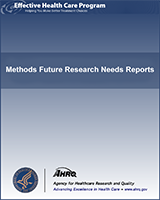NCBI Bookshelf. A service of the National Library of Medicine, National Institutes of Health.
Structured Abstract
Objectives:
To evaluate the impact of EPC systematic reviews on solicited or funded research and to identify barriers and facilitators to the impact of these documents on future research.
Data Sources:
ISI Web of Science, MEDLINE®, reviews of citations from updated systematic reviews, National Institutes of Health Guide for Grants and Contracts Web site, key informant interviews, and data from AHRQ on dissemination.
Methods:
We selected two systematic reviews as case studies to evaluate their impact on future research. We identified key citations generated by these reports and traced forward to identify their impact on subsequent studies through citation analysis. We reviewed requests for application and program announcements and dissemination data from AHRQ to identify impact. We conducted interviews with 13 key informants to help identify short-, medium-and long-term impacts of the EPC reports.
Results:
The impact of the selected EPC case studies is demonstrably greater on short-term outcomes( greater awareness of the issues)than on medium-term (such as the generation of new knowledge) or long-term outcomes (such as changes in patient practice or health outcomes). The extent of impact of an EPC report varies based on factors such as the topic and the timing of the report relative to the development of the field. The degree to which the new research can be directly attributed to the AHRQ reports remains unclear. Key informants discussed several benefits stemming from the EPC reports, including providing a foundation for the research community on which to build, heightening awareness of the gaps in knowledge, increasing the quality of research, and sparking new directions of research. However, the degree to which these reports were influential and well received hinged on several factors including marketing efforts, the very nature of the reports, and other influences external to the EPC domain.
Conclusions:
Our findings illustrate the importance of the breadth, specificity, and readiness of the topic for more research; ongoing developments in the field; availability of funding; and active engagement of champions. AHRQ and the EPCs may be able to improve the likelihood of impact by creating more targeted products, planning for and expanding dissemination activities, improving the readability and other attributes of the reports themselves, and actively involving funders early on and throughout the process of creating and publishing the reviews.
Contents
Other contributors: Lucia Rojas-Smith, PhD; Douglas Kamerow, MD; Elizabeth Tant, BA; Marianne Kluckman, MA; Carol Woodell, BA; Dan Jonas, MD, MPH; Timothy Carey, MD.
Suggested citation:
Viswanathan M., Nerz P, Dalberth B, Voisin C, Lohr K.N. Assessing the Impact of AHRQ Evidence-based Practice Center (EPC)Reports on Future Research. Methods Future Research Needs Report No. 7. (Prepared by the RTI International–University of North Carolina Evidence-based Practice Center under Contract No. 290 -2007-10056-I.)AHRQ Publication No. 11-EHC058-EF. Rockville, MD: Agency for Healthcare Research and Quality. June 2011. Available at: www.effectivehealthcare.ahrq.gov/reports/final.cfm.
This report is based on research conducted by the RTI-UNC Evidence-based Practice Center (EPC) under contract to the Agency for Healthcare Research and Quality (AHRQ), Rockville, MD (Contract No. 290-2007-10056-I).The findings and conclusions in this document are those of the author(s), who are responsible for its content, and do not necessarily represent the views of AHRQ. No statement in this report should be construed as an official position of AHRQ or of the U.S. Department of Health and Human Services.
The information in this report is intended to help health care researchers and funders of research make well-informed decisions in designing and funding research and thereby improve the quality of health care services. This report is not intended to be a substitute for the application of scientific judgment. Anyone who makes decisions concerning the provision of clinical care should consider this report in the same way as any medical research and in conjunction with all other pertinent information, i.e., in the context of available resources and circumstances.
This report may be used, in whole or in part, as the basis for research design or funding opportunity announcements. AHRQ or U.S. Department of Health and Human Services endorsement of such derivative products may not be stated or implied.
None of the investigators has any affiliations or financial involvement that conflicts with the material presented in this report.
- 1
540 Gaither Road, Rockville, MD 20850; www
.ahrq.gov
- NLM CatalogRelated NLM Catalog Entries
- Review Assessing the impact of systematic reviews on future research: two case studies.[J Comp Eff Res. 2012]Review Assessing the impact of systematic reviews on future research: two case studies.Viswanathan M, Nerz P, Dalberth B, Voisin C, Lohr KN, Tant E, Jonas DE, Carey T. J Comp Eff Res. 2012 Jul; 1(4):329-46.
- Review Understanding Health-Systems' Use of and Need for Evidence To Inform Decisionmaking[ 2017]Review Understanding Health-Systems' Use of and Need for Evidence To Inform DecisionmakingWhite CM, Sanders Schmidler GD, Butler M, Wang Z, Robinson K, Mitchell MD, Berkman N, Henderson J, Fiordalisi C, Hartling L, et al. 2017 Oct
- The future of Cochrane Neonatal.[Early Hum Dev. 2020]The future of Cochrane Neonatal.Soll RF, Ovelman C, McGuire W. Early Hum Dev. 2020 Nov; 150:105191. Epub 2020 Sep 12.
- Beyond the black stump: rapid reviews of health research issues affecting regional, rural and remote Australia.[Med J Aust. 2020]Beyond the black stump: rapid reviews of health research issues affecting regional, rural and remote Australia.Osborne SR, Alston LV, Bolton KA, Whelan J, Reeve E, Wong Shee A, Browne J, Walker T, Versace VL, Allender S, et al. Med J Aust. 2020 Dec; 213 Suppl 11:S3-S32.e1.
- Review Improving Health Systems’ Access to High-Quality Evidence: AHRQ EPC 2018 Pilot Projects Summary[ 2019]Review Improving Health Systems’ Access to High-Quality Evidence: AHRQ EPC 2018 Pilot Projects SummaryFiordalisi CV, Borsky A, Chang S, Gerrity M, Schmidt AM, Guise JM. 2019 Aug
- Assessing the Impact of AHRQ Evidence-Based Practice Center (EPC) Reports on Fut...Assessing the Impact of AHRQ Evidence-Based Practice Center (EPC) Reports on Future Research
Your browsing activity is empty.
Activity recording is turned off.
See more...
